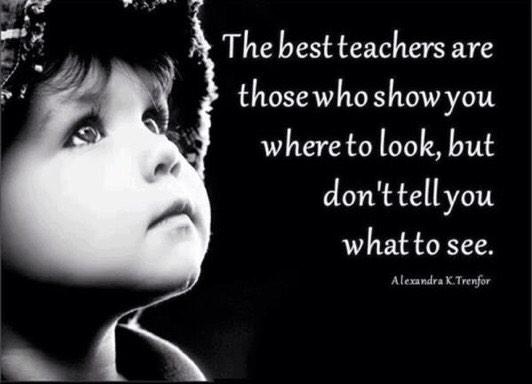Lindsey Lipsky @LindseyLipsky shared this quote on #satchatwc this morning. It struck a chord with me as I consider why I do what I do as an educator. I would like to add to the quote that not only do the best teachers not tell you what to see, but they also refuse to provide answers and only guide learning by asking questions.
I know that as educators we want to help and guide our students. One of the most difficult things I had to teach myself was not to give students answers. It is like the student who yells out an answer, once an answer is given, the thinking in the classroom stops. This creates a cycle of passive learning in which students learn quickly that someone else will answer for them.
My solution to students coming to me for answers is to respond by asking a question.
I'm not talking about creating open-ended questions that are related to a specific lesson or unit of study. I am talking about generic questions that you have on hand (on a clipboard as you train yourself) ready to use in ANY situation. Here are some examples:
Mrs. Beck, how do you spell information?
Mrs. Beck, how do you spell information?
- Say the word, what does it start with? (student will hopefully say, "in"), if not I will say, "in" how do you spell that? Write it.
- What is next? (student will hopefully say, "for"), if not I will say, "for" how do you spell that? Write it.
- When I get to the "tion" I will discuss and ask the student, "what do you know about how to make the tion (shun) sound? Are there any words around the room that can help you with this sound?
This also works extremely well for mathematics. I used this process in my middle school math classes.
Mrs. Beck I am stuck on this problem.
Mrs. Beck I am stuck on this problem.
- What do you know about this problem?
- What have you tried or where do you think you should start?
- What do you know about ratios? (or whatever we are studying)
- Can you go and work on the problem
I would love to give you more specific questions, but they really need to be tailored to the particular situation and/or student. My suggestion is, DO NOT ANSWER, ONLY QUESTION. It will teach your students that answers are found every where except from the teacher. Teachers will guide you in your search, but ultimately it is the students' responsibility to find the answers.
In my new role as Curriculum Coordinator, I am asking questions while working with teachers. When we work in PLC groups or leadership groups, I ask questions to move their thinking. I model in the hope that they will question their students more.
You know you are asking enough questions when students come to you and say, "Mrs. Beck, I know you will not tell me anything about this problem, but will you please ask me some questions so I can get my thinking started and figure this out?"
You will also know that you are asking enough questions when your spouse and/or child say, "Kris/Mom, I am going to ask you a question and I want an answer, not a question!" (there may be a tone in their voice as they make this request).
It is easy to provide answers, the challenging thing is to take the time to ask questions which allows others to think and grow as learners.

No comments:
Post a Comment